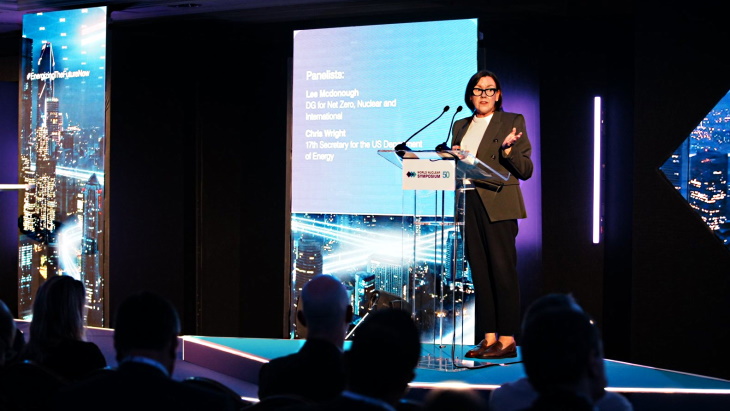Nuclear power is at the forefront of the UK government’s acceleration to net-zero, Lee McDonough, Director General, Net Zero, Nuclear and International at the Department for Energy Security and Net Zero told World Nuclear Symposium 50 in London on Thursday.
“Here in the UK, the Department for Energy and Security Net Zero (DESNZ) is focused on delivering two key missions: kick-starting economic growth, and making Britain a clean energy superpower, rebuilding Britain, bringing bills down and accelerating towards net-zero. And nuclear is uniquely placed to deliver for both of those missions,” she said.
McDonough noted that over the past few months, the government took important decisions, “which the Secretary of State for Energy Security and Net Zero has hailed as decisive steps to usher in a new golden age of nuclear”.
She said the UK’s new nuclear energy programme includes signing a multi-billion-pound commercial deal for the Sizewell C power plant, “securing our home-grown nuclear supply far beyond our clean energy target of 2030”.
McDonough added: “And for the first time, we have created a new funding model to successfully track world-class investments to run the project alongside us. This deal, which was agreed in July, will deliver clean power to consumers for decades to come and will open up new possibilities for the financing of future nuclear projects.”
The government has also announced GBP2.5 billion (USD3.6 billion) for small modular reactors (SMRs) and in June selected Rolls-Royce SMR as the bidder to partner with Great British Energy – Nuclear to deliver SMRs at home and “to help realise our long-term ambition of delivering one of Europe’s first small modular reactors”.
In addition, it also committed GBP2.5 billion for nuclear fusion.
“These are plans for the future,” McDonough said. “These are real significant amounts of investment over the course of this Parliament and beyond.”
However, she added: “It’s not just about announcing a big nuclear power station. That’s great. We need to create the context for these projects to succeed and to be able to move rapidly. And so we’ve also taken significant steps to unlock the planning process. for all kinds of infrastructure, actually not just nuclear. So this will apply across the country and hopefully be vital to securing pace.
“The other thing we’ve done is create a context where nuclear can be deployed more broadly in different places across the country on top of the existing nuclear licence sites that we have. And that’s really looking to the future to think about how we can enable both gigawatts but also advanced nuclear technologies that are coming down the line, whilst of course maintaining the highest standards of safety, security and environmental protection.”
The government has also set up a nuclear regulatory task force. “This is really to look at how we can enable innovation, streamline regulatory processes and unlock the UK’s full nuclear potential,” McDonough said.
“Our government is totally clear. If we’re going to kick-start the economy, if we’re going to achieve clean power by 2030 and deliver on net-zero, then nuclear must play a central role. However, the golden age that the Secretary of State spoke of is not specific to the UK, as we have heard. Indeed, our achievements must be part of a wider global success story which depends entirely on effective collaboration with our like-minded partner governments and industries.”

